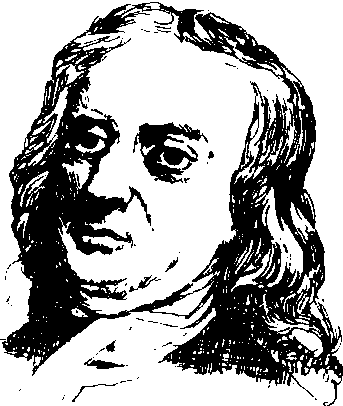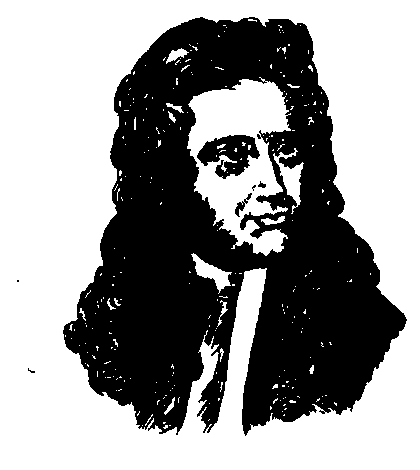牛顿1642—1727Niudun,I,Newton
英国数学家、物理学家和天文学家.牛顿是科学史上的巨匠,对数学的最大贡献是他和莱布尼兹各自独立地创立了微积分.1665年,他在剑桥大学三一学院获学士学位.那时正值伦敦流行鼠疫,23岁的牛顿返回故乡,进入了科学上的高度创造时期,二项式定理,流数术(微积分),万有引力定律,色散实验及第一架反射式望远镜都是在这一时期完成的.这些工作.奠定了他做为近代数学与经典物理学奠基人的历史地位.在牛顿之前,数学家们已经积累了大量与微分、积分有关的成果,但只有牛顿和莱布尼兹才明确建立了它们之间的本质关联——微积分基本定理,建立了系统的概念并发展了一般性的算法.除微积分与二项式定理外,牛顿还给出了求多项式根的上界的规则,建立了求方程近似根的法则,并对三次曲线进行了系统的分类等.后人以其突出贡献,把他与阿基米德、高斯并列为历史上最伟大的三位数学家。
牛顿1642.12.25~1727.3.20NiudunIsaac Newton
英国伟大的物理学家、数学家、天文学家。恩格斯说:“牛顿由于发现了万有引力定律而创立了天文学,由于进行了光的分解而创立了科学的光学,由于建立了二项式定理和无限理论而创立了科学的数学,由于认识了力学的本性而创立了科学的力学。”的确,牛顿在自然科学领域里作了奠基的贡献,堪称科学巨匠。牛顿生于英国北部林肯郡的一个农民家里。1661年,考上剑桥大学特里尼蒂学院,1665年毕业。这时正赶上鼠疫,牛顿回家避疫两年,其间几乎考虑了他一生中所研究的各个方面,特别是他一生中的几项主要贡献:万有引力定律、经典力学、微积分和光学。
万有引力定律的发现是牛顿在自然科学中最辉煌的成就。和他同一时代的胡克等科学家,都曾探索过天体运动的奥秘,但因为他们缺乏牛顿的数学才能,都没有能够解决。牛顿认为太阳吸引各行星的力,地球吸引月球的力和地球吸引地面上一切物体的重力都是同样性质的力,并服从同样的规律。1665年,牛顿用微积分研究物体运动理论,证明开普勒的三大定律。1687年,他正式公布了万有引力定律:任何两个物体都是相互吸引的,引力的大小跟两个物体的质量的乘积成正比,跟它们的距离的平方成反比。论文发表后引起了皇家学会的巨大反响。牛顿在1687年问世的巨著《自然哲学的数学原理》一书,在科学史上占有重要的地位。人们称这部书是17世纪数学、物理的百科全书。他论述了科学研究的方法,木星、木卫、月亮和慧星等天体的运动,海水的涨潮和落潮,振动和声波的性质等问题,但贯穿全书并构成全书核心的则是力学的三大定律和万有引力定律。牛顿运动三定律,是力学的基础,也是整个经典物理学的重要支柱。这三条运动定律,是牛顿在伽利略等人研究的基础上,反复思考研究而发现并确立的。牛顿第一定律也叫惯性定律,它表明一切物体在没有受到外力作用的时候,总保持静止或匀速直线运动状态,直到有外力迫使它改变这种状态为止。牛顿第二定律是说物体在外力的作用下,运动状态发生改变,物体运动的加速度跟作用力成正比,跟物体的质量成反比。牛顿第三定律是说两个物体之间的作用力和反作用力总是大小相等,方向相反。沿同一条直线,分别作用在不同物体上。牛顿在光学方面的成就也是极其伟大的。他对日冕作了观察,对白光进行了颜色的分析,他成功地研制了反射望远望,并因此成为英国皇家学会会员,他对于光的衍射现象进行研究,发现了牛顿环的惊人现象,他还研究了光的振动理论。牛顿一生所取得的伟大成就是他终生刻苦钻研、独立思考的结果。少年时为了测暴风雨中的风速,曾象疯子似的在狂风雨中奔跑,他专心致志地思考问题,竟然把怀表当做鸡蛋煮在锅里,连请客吃饭的场面也阻止不了他思考问题。他终生未婚,把全部精力都献给了科学研究事业。
牛顿1642—1727年Niudun
由一个成熟的苹果自然落地引起思考进而推出“万有引力定律”的人,就是牛顿。牛顿从小与外祖母一起过着贫困孤苦的生活, 12岁进入格兰汉镇小学读书。他爱科学, 经常自制一些灵巧的小机械, 比如仿照沙漏钟的制法做了水钟,使小水池中的水缓缓下流,浮标随水面的降低而下降带动指针, 指示时刻。他聪明好学而且意志坚强,“无论做什么事情,只要肯努力奋斗,没有不成功的”是他的信条。1665年牛顿以优异成绩毕业于剑桥大学三一专校后不久,创立的“二项式定理”和“微积分”学,为数学界开辟了一个新纪元。1687年夏, 《格物原理》出版,书中用数学解释了哥白尼学说,以太阳为中心,而与所距离的平方成反比例的引力, 解说了天体运动的现象,并详细阐明了著名的牛顿第三定律。他注意研究光学,在暗室中,利用三棱镜折射光,发现了阳光的七色现象, 从而推翻了传统的错误理论。鉴于他的成就,1703年牛顿被选为英国皇家学会会长,直至逝世。他一直是一个孜孜不倦的科学家, 工作起来总是专心致志,有时在实验室一连六个星期不分昼夜地实验,经常废寝忘食。一次他请人吃饭,饭菜摆好后,他忙于计算月球轨道又钻进了实验室,客人们知道牛顿的脾气,便吃完饭走了, 等牛顿从实验室出来, 看到空盘剩骨头,说道:“我还以为自己没吃过饭,其实已经吃过了。”作为一位伟大的科学家,牛顿还有着谦虚的品质,他说过:“如果我所见的比别人远一点,那是因为我站在巨人的肩上的缘故。”恩格斯评价牛顿时说:“牛顿由于发现了 ‘万有引力’定律而创立了科学的天文学, 由于进行了光的分解,而创立了科学的光学,由于创立了二项式定理和无限理论而创立了科学的数学, 由于认识了力的本质,而创立了科学的力学。”可见,牛顿的贡献是巨大的。
牛顿1642—1727Niudun,Newton,I.
英国数学家、物理学家和天文学家。1664年,他在剑桥大学三一学院获得学士学位, 次年夏天因伦敦流行鼠疫学校停办,牛顿返回故乡。在随后的两年时间里完成了二项式定理、流数术(微积分)、万有引力定律、色散实验及第一架反射式望远镜等重大创造及发现, 奠定了他做为近代数学与经典物理学奠基人的历史地位, 当时他还不到25岁。牛顿对数学最大的贡献是他和莱布尼茨各自独立地创立了微积分。在他们之前, 数学家们虽已积累了许多与微分积分有关的成果, 但只有牛顿和莱布尼茨才明确建立了它们之间的本质关联——微积分基本定理, 建立了系统的概念并发展了一般性的算法。此外,牛顿还给出了求多项式根的上界的规则,求方程近似根的方法,并对三次曲线进行了系统的分类。后人把他与阿基米德、高斯并列为历史上最伟大的三位数学家。

牛顿家境贫寒,上学很难。在他12岁时, 由牛顿的舅父极力帮助上了格朗达姆镇学校。开始,他对功课毫无兴趣,成绩很差,常被同学们瞧不起和欺侮。一次,一个同学无理地一脚踢在他的肚子上, 那同学成绩在牛顿之上。牛顿在肉体和精神上都受到了强烈的痛苦。从此, 他发愤学习, 成绩在全班之首。
牛顿成为一名出色的科学家之后, 他工作极为勤奋,有时聚精会神忘记了其它。一次他请朋友吃晚饭,他离席去拿酒, 可是他竟把取酒之事忘了, 而穿上白衣,进了祈祷室。另一次,牛顿的朋友斯图克利博士请他吃鸡。牛顿出去一会儿,就忘了吃饭这事,斯图克利把鸡吃了,又把骨头放在盘子里盖好。牛顿回来后,发现了骨头。他说:“亲爱的;我竟然忘了我们已经吃了饭了!”还有一次,他从格兰瑟姆骑马回家,下了马步行牵着它上城外的斯皮特门山。牛顿不知道马在山道上滑脱了,到了山顶,才发现手里只剩下空缰绳。在牛顿的大脑中,无时无刻不在思考着关于数学的、物理学的各种问题。众所周知的苹果落地的事情,就是在他经过长期思考、酝酿之后,苹果又激发了他的灵感,使牛顿发现了万有引力。
牛顿有些令人难忘的名言: 我不知道世人对我怎样看,只觉得自己像是海滨游戏的顽童,间或为找到一个光滑的石头或美丽的贝壳而喜悦, 而真理之海却在我前面未被发现。如果我所见的比笛卡尔远一点,那是因为我站在巨人肩头的缘故。
在牛顿的墓地, 在墓碑上浮雕中刻着几个青年手撑牛顿主要发现的标志。牛顿雕像的肘部放在他的几本著作上,两青年站在像前,手托画着太阳系图和收敛级数的卷轴。碑上刻着一首总结他光辉灿烂一生的诗,这是诗的前几句:
这里,
躺着牛顿爵士,
他, 以几乎超自然的思想,
以他的数学火炬, 首先证明了行星的
运动和图形, 彗星的轨道和海洋的潮汐。
牛顿1642. 12. 25—1727.3. 20Niudun,Isaac Newton
英国伟大的物理学家、数学家、天文学家。是现代自然科学的奠基人,经典物理学的创始人,堪称科学巨匠。牛顿少年时代天资平常,很喜欢制作各种机械模型,搞小试验、小发明,对自然现象好奇好学,喜欢读书,勤于思考。后在一些著名老师和学者的熏陶与培养下,对数学和自然科学产生了浓厚的兴趣,从而踏上了科学研究的领域,创建了前所未有的业绩。牛顿以超人的聪明才智,集16、17世纪科学先驱们成果之大成,在自然科学史上第一个大量地运用数学方法来系统地整理物理理论,完成了举世闻名的巨著《自然哲学的数学原理》,于1687年正式出版。从而建立了一个完整的力学理论体系,即经典力学体系,其主要内容包括牛顿三定律和万有引力定律,把天地间万物的运动规律概括在一个严密的统一理论之中。这是人类认识自然的历史中第一次理论的伟大综合。牛顿在前人工作的基础上,从概念上肯定了地球上的重力和天体间的引力的同一性,并且用数学方法表示出了万有引力定律,所以在科学史上牛顿首先发现了万有引力定律。万有引力定律屡建奇功,硕果累累。利用这一定律,后来人们预测了海王星、冥王星的发现等等。牛顿第一定律(惯性定律)最初由伽利略提出,后来是由笛卡儿完善的。牛顿第三定律(作用力反作用力定律)由华里斯、雷恩和惠更斯发现和验证的。牛顿第二定律是牛顿1684年发现的。牛顿三定律从孤立到统一整体,并把它确认为动力学的基本定律和经典力学的基石,这个功绩应归于牛顿的伟大综合。《自然哲学的数学原理》被誉为世界上伟大的著作,在近代自然科学发展史上占有里程碑式的重要作用。就数学而论,只有欧几里德的《几何学原本》可和它相比,就它的思想上的影响而论,只有达尔文的《物种起源》可和它媲美。人们称它是17世纪物理、数学的百科全书。牛顿和德国数学家莱布尼兹几乎同时各自独立地创立了微积分学。在光学方面牛顿的贡献是很大的。1666年他利用玻璃棱镜把白光分解为七色光,从而证明了白光的复杂性;发现了色差;1668—1671年制成了反射式望远镜——牛顿望远镜;研究了光的干涉和衍射,发现了薄膜干涉现象——牛顿环;他提出了光的“微粒说”,为光的波粒二象性理论做出了开拓性贡献,等等。

牛顿一生所取得的伟大成就是他终生刻苦钻研、耐心试验、勤于思索的结果。少年时为了测暴风雨中的风速,曾像疯子似的在狂风雨中奔跑;他专心致志地思考问题,竟然把怀表当做鸡蛋煮在锅里;他思考问题和做试验竟把请朋友吃饭的事忘得一干二净。他谦虚,善于向别人学习,吸取营养。1927年去世前,他说了一段名言:“如果我见到的比笛卡儿要远些,那是因为我站在巨人的肩上。”牛顿所说的巨人,是指当时众多的科学家及其科学成果。牛顿的科学成就对以后两个多世纪的自然科学的发展产生了巨大影响,为了纪念他,除以他名字命名的定律外,国际单位制中规定力的单位为牛顿。
牛顿1642—1727Niudun,Isaac Newton
英国物理学家、数学家。出生于一个普通的农民家庭。从小就热爱科学,但由于成绩不好,常受同学的嘲笑。后来他立志发奋,各门功课都取得优异成绩。18岁时,他以减费生的身分进入著名的剑桥大学,23岁获学士学位。在大学期间,他创立了“二项式定理”,并奠定了微积分学的基础。1669—1701年,他为剑桥大学教授。受苹果从树上坠落的启示,他创立了“万有引力定律”,并在总结伽利略等人有关学说的基础上证明了任何物体都要遵循惯性定律、质点运动定律和作用与反作用定律,即“牛顿运动定律”。运用这三大定律和万有引力定律,不仅计算出了行星围绕太阳的运动,卫星围绕行星的运动,还说明了地面上物体的降落运动和抛射运动,以及海洋潮汐发生的原理,并能确定彗星的轨道和运转周期。牛顿还最早提出发射人造卫星的设想。他的理论奠定了近代力学和天文学的基础。1666年,他用三棱镜分析日光,证明日光是由七种不同颜色的光线混合而成的,并制作了牛顿色盘,为光谱分析奠定了基础。牛顿一生硕果累累,但他还是谦虚地说: “如果我所看的比笛卡尔要远一点, 那是因为我站在巨人的肩膀上的缘故。”
牛顿
英国天文学家。发现万有引力定律,并用万有引力定律给出了开普勒行星运动定律的力学解释,说明各种潮汐现象的成因,推测出地球为两极较扁的球体等。创制反射望远镜。参见“物理”中的“牛顿”。
牛顿1642—1727Isaac Newton
英国物理学家。在伽利略等人工作基础上进行研究,总结出成为经典力学基础的牛顿运动定律。发现了万有引力定律。将地球上物体的力学和天体力学统一到一个基本力学体系中,创立了经典力学理论体系。正确地反映了宏观物体低速运动的宏观运动规律,实现自然科学的第一次大统一。光学方面,致力于色的现象和光的本性研究,创立光的微粒说,从一个方面反映了光的运动性质。热学方面,确定了冷却定律。在数学、天文学等领域也有许多成果。所著《自然哲学的数学原理》于1687年全部出版,该书总结了他一生许多重要发现和研究成果,叙述了经典力学的基础。
牛顿
英国数学家、物理学家。在数学方面,发现二项式定理,在前人工作基础上,提出了“流数法”,研究微积分学,得到微积分学基本定理,与莱布尼兹一起成为微积分学的创始人。参见“物理”中的“牛顿”。
牛顿1642-1727Isaac Newton
英国物理学家、数学家和天文学家。生于英国林肯郡的一个农村。从小体质差,喜爱数学、手工劳动。1665年毕业于剑桥大学,1669年任该校数学教授,曾先后两次当选为国会议员,任过多年造币局局长,1703年被选为英国皇家学会会长,直到逝世。他在力学、光学、热学、数学、天文学领域都做出过杰出的贡献,建立了经典力学的基本体系。和莱布尼茨共同创立了微积分。主要著作有《自然哲学的数学原理》、《光学》。其科技伦理思想与行为主要表现在:(一)勤奋。他常常废寝忘食地做实验和思考问题,其实验室夜间总是灯火通明,很少在凌晨二、三点钟以前休息。终生独身不娶,献身于科学。(二)谦虚。他虽成就卓著,却毫无骄矜之心,并反对别人对他的赞颂。他说:“我不知道世人怎样看我,但在我自己看来,我只是像一个在沙滩上玩耍的男孩,一会儿找到一颗特别光滑的卵石,一会儿发现一只异常美丽的贝壳,就这样使自己娱乐消遣;而与此同时,真理的汪洋大海在我眼前未被认识、未被发现。”“如果我所见的比笛卡儿远一点,那是因为我站在巨人们肩上的缘故。”
牛顿
牛顿 (1642—1727),英国的物理学家、数学家、天文学家,生于林肯郡格兰瑟姆。从小喜欢手工劳动,做的风车、风筝、日晷、漏壶等都十分精巧。1665年毕业于剑桥大学三一学院,获学士学位,1668年获文学硕士学位。1669年任三一学院教授。曾任英国皇家学会会长。
在力学方面,牛顿在伽利略等人工作的基础上进行深入研究,总结出机械运动的三个基本定律。进一步发展开普勒等人的工作,发现万有引力定律。把地球上物体的力学和天体力学统一到一个基本的力学体系中,创立经典力学体系。它正确地反映了宏观物体低速运动的客观规律,实现了自然科学的第一次大综合。这是人类对自然界认识的一次飞跃。
在光学方面,牛顿曾致力于色的现象和光的本性的研究。1666年用三棱镜分析日光,发现白光由不同颜色 (即不同波长) 的光构成,成为光谱分析基础,并制作了牛顿色盘。发现光的一种干涉图样,称为牛顿环。创立光的 “微粒说”,在一定程度上反映了光的本性。1704年出版《光学》 一书。
在热学方面,牛顿确定了冷却定律,即当物体表面与周围存在温度差时,单位时间内从单位面积上散失的热量与这一温度差成正比。在数学方面,牛顿在前人工作的基础上,建立了二项式定理,并和莱布尼兹几乎同时创立了微积分学,开辟数学上的一个新纪元。
在天文学方面,牛顿于1671年创制反射望远镜,初步考察行星运动规律。解释潮汐现象,预言地球不是正球体,并由此说明岁差现象等。
牛顿的名作 《自然哲学数学原理》(1687) 用数学解释了哥白尼学说和天体运动的现象,阐明了运动三定律和万有引力定律等。牛顿的哲学思想基本上属于自发的唯物主义,如承认时间、空间的客观存在。但又认为时间、空间同运动的物质相脱离,相互间并无联系,因而提出所谓绝对时间和绝对空间的观点,这就具有形而上学的性质。还受亚里士多德的影响,提出一切行星都在某种外来的 “第一推动力” 作用下由静止开始运动的说法。晚年埋头编写以神学为题材的著作,在唯心主义的道路上越走越远。由于牛顿在科学上的成就符合新兴资产阶级利益,因而得到资产阶级的极大重视。1688年成为英国议会议员,并被授以爵士称号。逝世后葬于威斯敏特教堂。
牛顿
牛顿 (1643—1727),英国的物理学家、数学家、天文学家,生于林肯郡格兰瑟姆。从小喜欢手工劳动,做的风车、风筝、日晷、漏壶等都十分精巧。1665年毕业于剑桥大学三一学院,获学士学位,1668年获文学硕士学位,1669年任三一学院教授。曾任英国皇家学会会长。
在力学方面,牛顿在伽利略等人工作的基础上进行深入研究,总结出机械运动的三个基本定律。进一步发展开普勒等人的工作,发现万有引力定律。把地球上物体的力学和天体力学统一到一个基本的力学体系中,创立经典力学体系。它正确地反映了宏观物体低速运动的客观规律,实现了自然科学的第一次大综合。这是人类对自然界认识的一次飞跃。
在光学方面,牛顿曾致力于色的现象和光的本性的研究。1666年用三棱镜分析日光,发现白光由不同颜色 (即不同波长)的光构成,成为光谱分析基础,并制作了牛顿色盘。发现光的一种干涉图样,称为牛顿环。创立光的 “微粒说”,在一定程度上反映了光的本性。1704年出版 《光学》一书。
在热学方面,牛顿确定了冷却定律,即当物体表面与周围存在温度差时,单位时间内从单位面积上散失的热量与这一温度差成正比。在数学方面,牛顿在前人工作的基础上,建立了二项式定理,并和莱布尼兹几乎同时创立了微积分学,开辟数学上的一个新纪元。
在天文学方面,牛顿于1671年创制反射望远镜,初步考察行星运动规律。解释潮汐现象,预言地球不是正球体,并由此说明岁差现象等。
牛顿的名作 《自然哲学数学原理》 (1687)用数学解释了哥白尼学说和天体运动的现象,阐明了运动三定律和万有引力定律等。牛顿的哲学思想基本上属于自发的唯物主义,如承认时间、空间的客观存在。但又认为时间、空间同运动的物质相脱离,相互间并无联系,因而提出所谓绝对时间和绝对空间的观点,这就具有形而上学的性质。还受亚里士多德的影响,提出一切行星都在某种外来的“第一推动力”作用下由静止开始运动的说法。晚年埋头编写以神学为题材的著作,在唯心主义的道路上越走越远。由于牛顿在科学上的成就符合新兴资产阶级利益,因而得到资产阶级的极大重视。1688年成为英国议会议员,并被授予爵士称号。逝世后葬于威斯敏特教堂。
牛顿
力的单位。简称牛,符号N。地面附近质量是1千克的物体受到的重力,即它的重量,是9.8牛。通常说的体重实际是身体的质量,是以千克(公斤)为单位;体重70kg的人的重量是9.8(N/kg)×70(kg)=686N。
牛顿1642.12.25—1727.3.20Isaac Newton
牛顿生于英格兰东海岸中部林肯州(Lincolnshire)的格朗达姆(Grantham)镇南约13km的乌尔索浦(Woolsthorpe)小村子里,1727年3月20日卒于伦敦的肯星吞(Kensington)区。1661年,牛顿考入剑桥大学三一学院;1664年,牛顿取得了学士学位;1665—1666年间,牛顿发明了流数术(微积分)、万有引力和光的分析;1669年,牛顿任“路卡斯教授”;1696年被任命为造币厂监督;1699年为造币厂厂长;1703年被选为皇家学会主席;1705年,安娜女王(Queen Anne,1665—1714)封牛顿为爵士。牛顿不仅是世界上杰出的物理学家,而且是世界历史上与欧拉、阿基米德、高斯并列的贡献最大的四位数学家之一。牛顿划时代的贡献是微积分的创建,亲手制作了第一个反射望远镜,其巨著是《自然哲学的数学原理》。